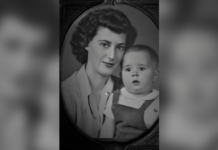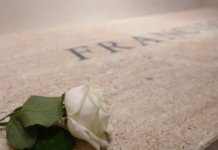
Editor’s Note: Veterans Day is Saturday, Nov. 11. Ceremonies will be held nationwide throughout the coming week. We encourage you to pause during this special time of observance to honor the service of our nation’s military men and women. And we extend our deepest gratitude and respect to veterans and their families, past and present, for what they have done and continue to do to protect us and preserve our nation’s freedom.
It is doubtful anyone loved their country more than the fallen soldier. He was the warrior who one day walked onto a battlefield fiercely determined to protect and defend his beloved America, only to never return to its shores. Not including the Civil War, we have lost almost 700,000 service members on battlegrounds because of such courageous love.
These soldiers were born into families that were of different religions and different ethnicities. They were Republicans or Democrats or neither. However, on the battlefield, it mattered little because they were all in the same mud, the same trenches, experiencing the same horror and fighting together to save their country. They gave their lives to defend equality for all, for freedom to worship, and for Americans to have the freedom to speak and vote.
Courage has no color and no voice. Bravery is born of the heart, which believes there is no greater love than a person laying down his life for another. We need to look no further than the 700,000 graves scattered across this world to see headstones depicting such love.
My daddy always said, “When our country starts losing its way, and folks no longer take pride in America, that is the day war will begin, or a tragedy will occur to wake up the spirits of the fallen soldiers. That is the day we become unified. Our backyard debates and political party arguments go silent. We all realize at that critical time what matters most is saving the land of the free.”
When my father was thirteen, his widowed mother ran a boarding house near Jamestown, Tennessee. He was the youngest of four children, and he regularly helped his mama with the chores and duties of running the inn.
“Ray, you need to go to the train depot in the car to pick up Sergeant York and take him to his home,” she yelled from the kitchen one day.
Yes, she spoke of the same Sergeant Alvin C. York, World War I hero and recipient of the Medal of Honor and numerous other awards. In 1927, most 13-year-old boys knew the story of the famous Tennessean who stood exposed to gunfire from German machine gunners atop a hill in northern France. Nine of the seventeen men in his unit fell as a barrage of bullets tore through them. Quickly, York led the remaining soldiers in a charge to attack the hill. Being an expert marksman, Sergeant York silenced 35 machine guns and took 132 Germans as prisoners.
Also, in 1927, if a 13-year-old knew how to drive a car, he took the wheel. As Ray inched toward the train station, snow began to fall in Jamestown. Undeterred, as soon as the Sergeant got off the train, the boy proudly saluted him.
Ray Walker drove a hero eleven miles to his farm as the snow settled on the roads. When they arrived, the Sergeant stepped from the car, telling the lad to come in from the cold.
As the snow and ice accumulated, Sergeant York sent word to Ray’s mother, Rose, explaining why her son would stay with him until the weather cleared.
It took nearly four days for the roads to be drivable. During those days, the Sergeant told stories about the war and his service to the awestruck young boy who would later become my patriotic father.
Daddy always declared that when Sergeant York talked about his infamous battle, he spoke with deep sadness about the comrades he did not save on the hill that day in France. The Sergeant was a renowned hero, yes, but within his heart, he remained a man without pretense or pride and humble enough to make sure his new young friend was safe.
Gary Cooper won an Academy Award for portraying this remarkable man in 1941. After Alvin York received all the fame and accolades, the ailing Sergeant tried to enlist once again to fight in World War II.
If each American paused to remember folks like Alvin Cullum York or the 700,000 soldiers whose remains lie over battlefields worldwide, we might become a more grateful, thoughtful nation. If we teach our children the personal tragedy of war, they may understand the importance of peace.
All fallen soldiers have a story to tell of their heroism. They came from all corners of the United States and gave their lives for us. We must keep telling their story because we might garner enough courageous love to heal a divided country if we listen.
Do we need war or tragedy to unite us again, or might we learn a valuable lesson from the spirits of our fallen American soldiers?







